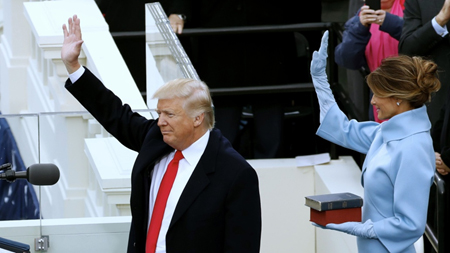

CHURCH AND STATE
The clergy at Trump’s inauguration belong to a church that believes poverty is a punishment for lack of faith

God bless the wealthy. (Reuters/Kevin Lamarque)
Ephrat Livni
January 20, 2017
Jesus Christ famously said in the New Testament that it was easier for a camel to pass through the eye of a needle than for a rich man to enter the kingdom of God (Matthew 19:24). Prosperity theology is a strain of Christianity that preaches the opposite: they believe God makes the faithful rich, and that poverty is punishment for lack of faith.
Today (Jan. 20), at US president Donald Trump’s inauguration ceremony, two of six clergy members in attendance were prosperity theology preachers. Reverend Paula White is the first female clergy member to participate in an inauguration and a televangelist. Bishop Wayne T. Jackson is an African-American pastor who preaches prosperity at his Detroit church, Great Faith Ministries International.
In September, before Trump was elected, The Washington Post wrote about Trump’s prosperity posse, relatively unknown pastors using the candidate to sell themselves. It starts with an account of Jackson laying a talit, or Jewish prayer shawl, on Trump in a half-empty church in Detroit. It was a symbol of Jackson’s support and a good example of the religious fusion that is prosperity theology, also known as the gospel of success.
The gospel is popular internationally. But it offends many Christians who see it as contradictory to Christ’s teachings. After it was announced that Trump had invited prosperity preachers to his inauguration, the National Catholic Reporter wrote of the gospel, “[It] basically teaches that God rewards true believers with material wealth. Indeed, material wealth is an exterior sign of God’s blessing. No wonder Trump loves them!”
The gospel of success is a sort of melange of Judaism and Christianity. Like Judaism, it preaches a contract, or covenant, with God, and it borrows symbols like the Jewish prayer shawl. But the gospel of success differs in the details of the God-human deal: prosperity theology says it’s God’s will for people to be happy and that he rewards the faithful with health, wealth, and happiness. In Judaism, the contract with God is that He protects the Jews and they keep His laws—no prosperity or happiness promised. And like Christianity, the gospel of success is concerned with Christ (though it ignores his warnings about wealth and worldly success, turning these things instead into proof positive of blessings).
What is perhaps most striking about prosperity theology is that it teaches that sickness and poverty are curses that can be broken by faith—and that faith is best expressed through donations to preachers, visualization, and positive confession. This is remarkable not only because it’s starkly different from the teachings of Jesus, but also for what it signals politically. When a president’s spiritual attendants adhere to a faith that says our financial and physical circumstances are a blessing or a curse from God—adjustable with payment, imagination, and apologetic talk—it probably doesn’t bode well for that president’s social systems.
Apart from these success preachers, Trump invited four other clergy members to the ceremony—three Christians and a Jewish rabbi. The New York Times wrote today that he was “laying it on thick” in the religion department. But it must have felt like a thin showing to the nation’s Muslims, Hindus, Buddhists, and other unrepresented faiths.







